Stopping Border Immigration: As Trump Builds His Wall, A Battle Wages Over Human Rights Conflicts
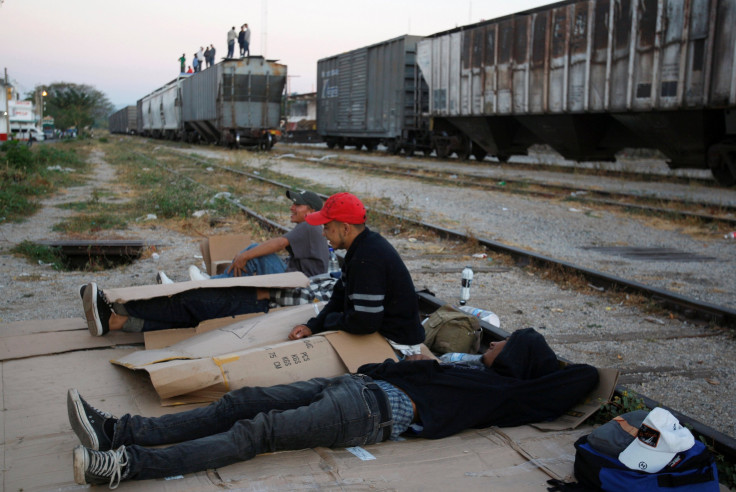
TUCSON, Arizona -- Tim Foley squints his eyes while scanning the rugged terrain of sloping valleys and barren red rock mountains along the U.S.-Mexico border for any sign of life, wrinkling his sunburnt face into a scowl when he notices a black-painted water bottle underneath a pile of rocks. Dust and sand float into the air as he kicks his boot deep into the earth, scoffing at the hidden resource left by local humanitarian groups for anyone making the treacherous journey across the border into the United States. Foley used to take part in slashing water bottles left out for what he says are "drug mules and illegals," but now refrains from even touching them.
"I'll do whatever it takes to stop them from getting across the border," Foley said. "But anytime we cut open those damn water bottles, the activists begin freaking out at us."
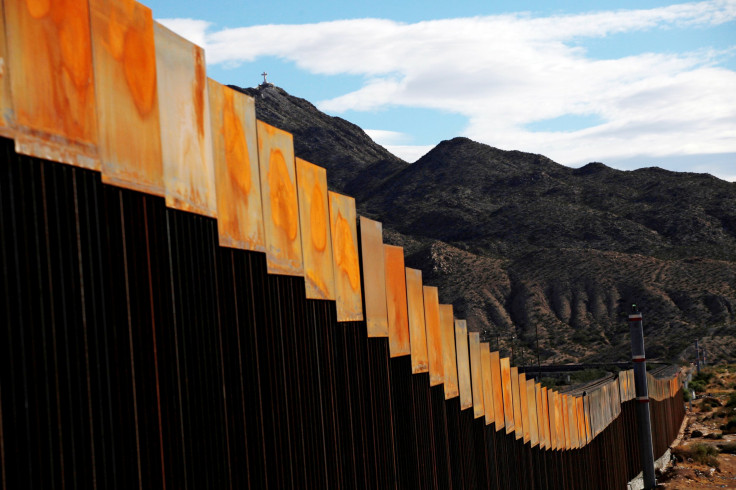
A battle has been waging on the nation's southern border for years over what – if any – basic human rights and protections migrants should be afforded while crossing the dangerous landscape. President Donald Trump's proposal to build a "big, beautiful wall" along the U.S.-Mexico border has made that debate even more urgent, with both sides of the argument predicting the construction project won't be enough to end all illegal immigration and drug trafficking. While militias and some Customs and Border Protection agents support increased security, detention centers and deportations along with a border wall, local humanitarian groups like No More Deaths describe the ongoing conflict as a "shameful human rights crisis" and fear the situation will only become grimmer under Trump.
The polarizing issue of border security catapulted to the forefront of the national debate over immigration reform during the 2016 presidential election, in which the president led a shockingly successful campaign initially based on just two key promises: to increase national security by building a wall along the southern border that Mexico would pay for, and to deport millions of undocumented immigrants immediately upon taking office.
Most Americans can't seem to agree on what to do with the nation’s unsecured southern border: post-election polls conducted by Quinnipiac University show the majority of Americans reject the idea of building a wall, with 55 percent opposing Trump's construction proposal and 42 percent supporting the project. Meanwhile, 60 percent of Americans think undocumented immigrants should be provided a pathway to citizenship, compared to 25 percent who believe they should leave the country.
Some walls already exist across stretches of the border, but millions of undocumented immigrants are still able to cross despite the physical barriers and harrowing conditions. Not everyone makes it. Thousands of bodies are found each year in the border's vaste deserts, beaches, rocky hills and rapid waters.
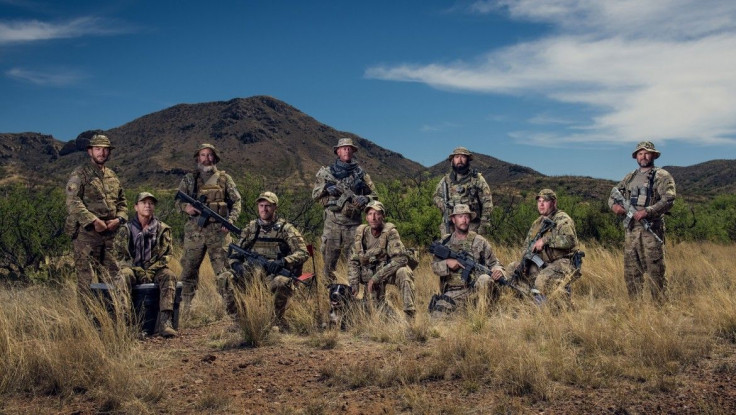
Foley is the founder of Arizona Border Recon, an armed militia of U.S. civilians voluntarily securing the nation's southern border in multiple operations each year. He came down to the border in 2010, just after the nation reached its peak undocumented immigrant population of 12.2 million. While rates in illegal immigration have slowly decreased since 2009, 2.5 million undocumented immigrants still managed to make it across the southern border, including in many areas where security fences, walls and Customs and Border Protection checkpoints already exist.
Despite the federal agency's expansion in size and funding under every president since Bill Clinton, Foley says the government's "asinine" inability to protect its citizens threatens American communities, the national workforce and the future of the country. He works side-by-side with federal agents on a near-daily basis, identifying trails and paths drug traffickers use to enter the country, as well as ways cartels are getting over the wall that already exists near Tucson, Arizona.
If Trump is successful in building his wall and increasing immigrant detention and deportation populations, federal agents and local militias say he could be the first president to win a major victory in the battle against unauthorized immigration and drug trafficking, while noting much more will need to be done to completely halt all illegal activity along the southern border. Foley's militia believes the White House will need to seriously ramp up border security under Trump by hiring private security contractors like Arizona Border Recon to guard his wall around the clock.
Militias like Foley's, along with Customs and Border Protection agents, have repeatedly been condemned by humanitarian organizations for destroying water bottles and other aid left in the desert for migrants crossing through the region. In the Tucson region alone, nearly 2,500 people have died crossing the border since 2001, and countless deaths remain unreported.
"They think they're helping out women and children, they say it's all for the 'poor women and children,' but they're dead wrong," Foley said of aid groups. "They're just giving the cartels and drug mules the food and supplies they need to get across."
Meanwhile, the National Border Patrol Council, a union representing the majority of Customs and Border Patrol agents, endorsed Trump during the Republican primaries in March 2016, writing in a statement, "if we do not secure our borders, American communities will continue to suffer at the hands of gangs, cartels, and violent criminals preying on the innocent."
But Maryada Vallet, a volunteer activist with the migrants' rights group No More Deaths, said U.S. officials and volunteer militias are responsible for "massive corruption and harmful racist acts that will only be emboldened under Trump."
No More Deaths gained 200 volunteers last year alone, in addition to the several thousand citizens already volunteering. Though countless water bottles and other supplies were destroyed or damaged, the organization delivered almost 20,000 gallons of water to the border.
No More Deaths also provided resources and assistance for thousands of migrants hoping to find their way home and reconnect with family members after their journey. The group maintained a desert first-aid clinic that operated nearly every single day throughout 2016, provided over 2,000 phone calls for migrants and recently-deported immigrants to family and recovered $54,134 from Arizona Department of Corrections for 469 of those sent back to their native-nations.
"We've demanded Customs and Border Protection stops destroying the water bottles and other resources we leave out for migrants after we caught agents vandalizing our property twice on cameras," Vallet told IBT. "We haven't necessarily formally requested the militias stop harming our supplies, since there isn't always a formal chain-of-command and militias tend to bubble up and disperse frequently, but we continue to assert our right, as well as the need, for our work to be done."
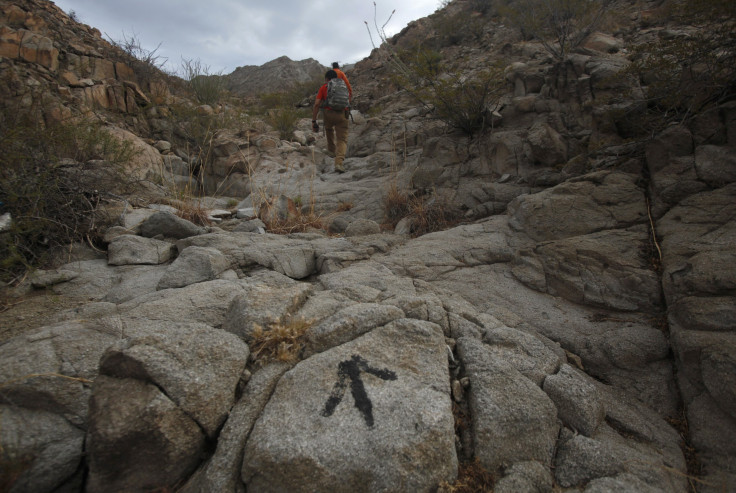
The American Civil Liberties Union said Customs and Border Protection officials should target Mexican cartels and human trafficking instead of going after migrants in the desert.
"They haven't been able to curb the power and growth of cartels virtually at all," Nathan Wessler, a staff attorney for ACLU's Speech, Privacy and Technology project, told IBT in a phone interview.
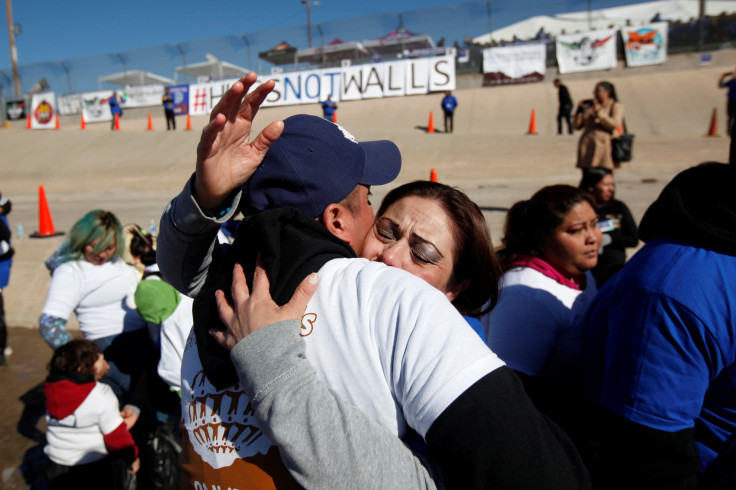
Activists like Vallet remain optimistic, however, that Trump's polarizing and potentially harmful actions toward undocumented immigrants will unite Americans in their opposition against human rights abuses, instead of against their southern neighbors.
"Despite massive corruption and harmful racist acts that will only be emboldened under Trump, I'm hopeful about the even more massive support we’ve seen since Trump's campaign," Vallet said. "The conversation over border and national security didn’t end with Trump’s election. It's taken on new life with millions of Americans presenting a simple message to the White House: no ban, no wall."
© Copyright IBTimes 2024. All rights reserved.












